Introduction: Fashion, Dance, and Battle of the Bands
I was recently inspired by this tweet proposing a Battle of the Bands for furry cons (or, more generally, more support for music made by furries that isn't just EDM). As it turns out, one convention already has done something similar (Anthro New England put on a furry rock concert this year), but the post got me thinking about a favorite topic of mine: the way things outside of traditional art, digital art, and fursuits have begun to gain traction in the fandom. Go back to the video footage of Anthrocon back in 1998 and, besides the heavy trappings of a '90s era home video, you'll notice things have changed in the past 20 years of furry conventions. For one, Anthrocon and others have grown a lot larger, but even in the schedule things have changed dramatically. Today, events like the Fursuit Dance Competition are a mainstay at most sizable conventions, but in '98, no such thing existed as such. There was the Masquerade, in which fursuiters performed what looks almost like a catwalk performance, but it focused on aspects not quite like what we might see in a dance competition today. Dance has taken a place for itself in our fandom, with Floor Wars, dance competitions, and even the nightly raves being "core staples" to many congoers' experience of the convention. Live music at conventions was initially thought to be too difficult and too niche to put on, but today people like Pepper Coyote and Fox Amoore play regularly at conventions -- including a theatrical musical at BLFC in 2018 -- and conventions like FWA have even booked non-furry talent like Bit Brigade in 2017 and Mystery Skulls in 2019. Of course, outside of music and dance furry has been evolving as well -- The F/F Collective will be releasing their second lookbook later this year, among other highlights. With all this transformative change occurring in what "furry" even looks like, I thought it prudent to ask: "What will the future hold for us?" That is, relative to that initial tweet, what might we imagine furry cons having in the future? What new iterations will befall us? What does the future of furry cons look like?
![[Whistles in Bob Dylan]](https://coyo.tl/images/blog/furconfuture/furconfuture1.png)
Welcome to Furry, Qualitative, an irregularly updated, carefully curated repository of musings on the status of the furry fandom. I make no claim to be a vetted historian or data scientist, but I do know other people who have smart thoughts about things, so in this repository I pose open-ended questions to people I know and collect their answers. In this piece, we'll be talking about the future of furry conventions, as predicted by a handful of folks in the spring of 2019.
Now, with this priming, I might direct our attention to evaluate the question as asked. After all, not everyone will be thinking of fantastical future plans for furry convention events when asked this question -- and even when they do, people don't always know what they want. For most people, this question would be very hard to answer in an interesting way. Coming up with new ideas is hard. Some respondents did go into thoughts on potential programming, and we'll get to them, but a lot took the opportunity to focus more on current trends and what the "next steps" so to speak may look like.
On Growth
With this in mind, what we might actually ask Joy Six-Pack-of-Hard-Cider-not-Beer in the main hallway of the convention and consistently expect insightful answers to is their perception of the changes in furry conventions more broadly. Which, turns out to be most of the responses I got. And these thoughts may echo those you already have yourself. Most respondents, for example, talked about the growth of furry conventions, and how that will almost assuredly continue (if you'd like to see quantitative data on this phenomenon, hop on over to my data visualizations on the attendance at various furry conventions of note). One respondent, in reflecting on the past 5 years in which they've been attending conventions, commented on this directly:
Furry convention attendance has grown at a significant rate over the last half decade. [...] It's not just the attendance too, the number of furry cons has increased tremendously. In just the past few years, cities like Salt Lake City, Chattanooga, Wisconsin Dells, Virginia Beach, and many more around the country and world have become the home of local furry conventions. It feels as if a con is happening every week, even forcing some people to make decisions on which to attend (FWA vs BLFC, IFC vs DenFur). The one thing that's for certain is that furry cons of the future will be larger and more numerous.
Another concurs:
The cons are only gonna get larger. One thing that may happen is that larger cons are gonna get more publicity, especially cons like MFF. What I mean is that maybe there will be billboards about them, just like when I see billboards for Anime Midwest when I'm driving down the street, or other large advertisements. Smaller cons might eventually have to move to bigger venues, so a large convention center may be the norm for all cons in the future.
(Astute readers may recall that Further Confusion has notably already advertised in the San Jose International Airport) [Ed. note: since original draft of this post, add FWA to that list]. A third respondent chimes in, including noting some idea about why they think this may be happening:
I think the future of furry conventions will just continue to grow. It's been growing by like a thousand every year. I'm sure that it is a bit due to general population growth, but mostly I'm sure it's because furries are losing their negative stigma.
[Ed. note: growth by 1000 attendees per year is probably in reference to conventions like MFF specifically; growth does seem to be related to convention size -- though not, in my mind, indicative of an exponential trend as others have proposed. See logistic growth as an alternative methodology]
The commentary about negative stigma is particularly interesting. In general, the furry fandom today seems to be less a demon to be exorcised from the internet and more a curiosity to be bemused by. This respondent does note that, furry might still be kind of a joke in many people's eyes, but any righteous fury anybody feels about folks interested in anthropomorphic animals on the internet by all accounts seems to be dying down. We can have our parade through Pittsburgh, we can have our spaces online, and folks have largely let this happen. Furries' treatment of artists (and in particular, the average attitude of "pay them well") is a frequent talking point compared to anything unsavoury. The future, we might say, looks bright.
To summarize, respondents largely believe that furry conventions will continue to grow, both in size and number, as they have on aggregate up to this point. This might manifest in various ways like conventions more commonly being held in large convention centers (like Anthrocon and MFF do) or actual outright advertising. There is also a belief supposed that this may have something to do with the general warming-up the internet has begun to undergo for furries (though, both respondents and I would note that a "warming up" does not yet imply that furries have no negative stigma remaining).
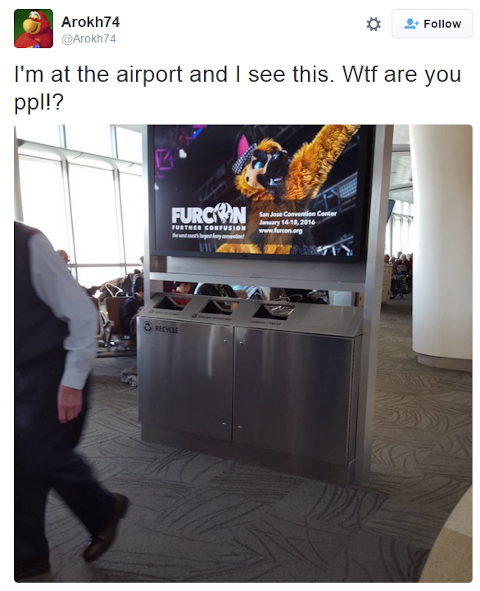
On the Consequences of Growth
While growth is obviously on many respondents' minds, growth unto itself is not the end of the story. One respondent talks about how furry is, though growing, still relatively niche:
With a larger attendance, you would think that furry is becoming more mainstream. I don't believe this is the case though. Furry remains in its own niche with participants being closely bonded in a community like no other. I do think that with the increasing size, more local cons/meets, and better community organization through things like Telegram, the fandom is becoming more regional. I feel that more and more furries tend to keep close to regional friends as opposed to online friends around the country, this includes at furry cons as well.
We might largely note that this squares up well with the idea of furry beginning to lose its negative stigma -- just because fewer people are deterred doesn't mean the whole of society is jumping on board. The idea about regional participation we might address more in a later section. To contrast, though, someone else remarks on one possible path forward for furry conventions they see:
[O]ne path is the cynical path that as the fandom becomes more mainstream, our cons are gonna start looking like mainstream cons. [...] I can definitely see cons becoming mainstream and having a separation between the guests/panel runners and congoers. Basically everything becoming more formal, structured, and commercial. Which would suck, but reflects how a lot of fandoms have gone.
What we might see in this response in particular, compared to the first respondent's, is how niche vs. mainstream doesn't have to mean the composition of attendees so much as policy decisions and how conventions are run. A third respondent, to some degree, adds to that in their response:
As cons become less a giant furmeet and become more... 'official', I guess? [This model of cons] has to [change]. These can't be casual functions anymore -- not in con space, at least. I think they are compelled to move closer to the larger functions [like Anime Central and Gen Con]. Legal liability is one reason, but also being bigger distributes -- and dilutes -- accountability across bigger and bigger groups of people. We have to share this space with more people now, and they increasingly don't have motives that align with ours. I don't intend to imply malice at all, just that people will have different attitudes.
This has, of course, been a repeating narrative in furry, that things must become more formalized. Horror stories like the legends of what happened at Rainfurrest 2015, or the story of what brought down Oklacon in 2014, or the infamous NJ FurBQ of 2012, abound about what happens when bad actors ruin the fun for everyone. These repeated rumors, I will note, often miss the mark on the actual dynamics at play in these conventions: Oklacon's final straw was the event, but they had a history of tension with the conservative state park rangers of Oklahoma, and the NJ FurBQ story was just outright a hoax. But despite this, the narrative persists; even the threat of bad action can be enough to get conventions like Califur shut down. We have seen, for example and unfortunate though necessary as it may be, more and more conventions and other outlets taking more formal stances against alt-right activity in the fandom, up to and including the expulsion of known bad actors before they can start trouble [Ed. note: see also]. Outside of alt-furry activity, the tensions between what may largely be seen as the quest for continued existence through respectability versus the desire for unlimited personal expression has been a growing conversation in furry, such as with the 2016 documentary Fursonas.
At large, then, respondents note that with growth comes potential changes in the cultures of furry conventions, and particularly how they are run. Things may necessarily grow more formalized, more rule-based, and so on, as conventions grow past the "giant furmeet" stage. Though the population may very well remain fairly niche (and, possibly, focus shifts from the old idea of furry as a thing that exists in communities on the internet to furry as a community that you see and interact with regularly and locally), conventions may by necessity have to replicate more "mainstream" conventions in their governance.
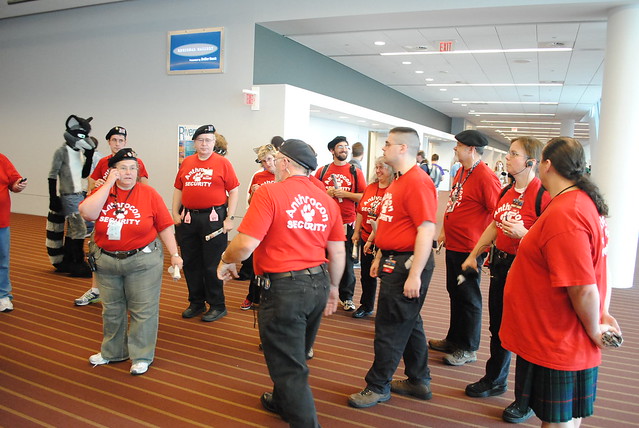
On "Celebrity" and the Fandom
With the disruptive nature of the internet on traditional models of distributing content, we have begun to see a whole new class of "celebrity" arise. The McElroy family well embodies what I mean by this. In particular, I would not be surprised to learn that a significant portion of people reading this have no clue who the McElroy family are, and another significant portion of people reading this know basically everything about the McElroy family. The brief summary to clue everyone in is that the McElroy family is a literal family (typically referring to three brothers, Justin, Travis, and Griffin McElroy, and sometimes also to their wives and their father) who have achieved C-list internet fame largely through an ever-growing empire of podcasts. Their work is largely comedy-based, has at times influenced actual, real celebrities like Lin-Manuel Miranda, and would probably be described as fairly niche. It's frequently absurdist, at times extremely genuine, and tries to be a welcoming environment for as many folks from as many backgrounds as possible. But I'm not here to give a sales pitch for the McElroy family; instead, I want to talk about the sort of celebrity they embody -- the niche, very respondent to their fanbase sorts of creators who we frequently see rising on places like Youtube and Twitch today.
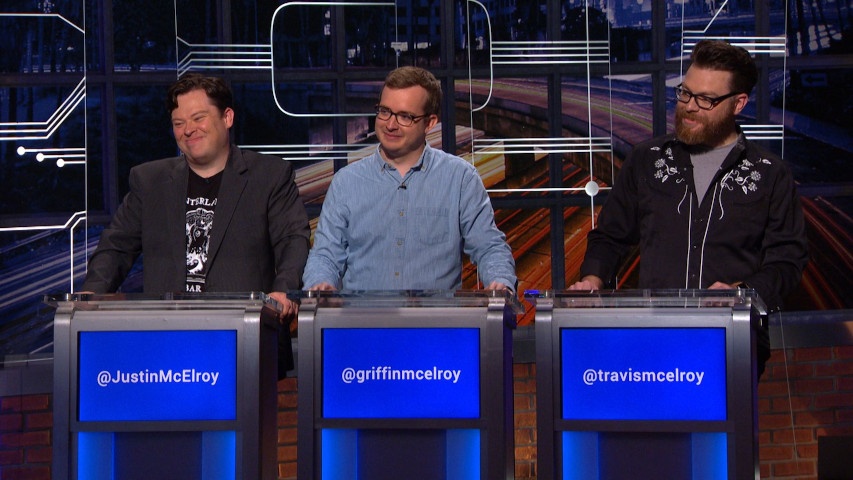
Furry is no stranger to these cases -- people like Majira Strawberry have, I am told, fairly large followings. And the fandom has never been stranger to these cases of what we might call "popufur" individuals (though that term tends to be somewhat vaguely defined beyond having large followings for various reasons). Some respondents point this "growing celebrity presence" out:
One other thing to mention is the growing celebrity presence in the fandom. The term "Popufur" is thrown around a lot, but its idea is becoming more and more prevalent at furry cons. Groups of adoring fans will gather around popular suiters, youtubers, and those in the fandom who have garnered enough clout. Much like how anime and comic cons have celebrities hosting panels and becoming major attractions to the con itself, I could see the furry con of the future head a little in this direction. I saw a furry con ad recently where one of the taglines was "With returning musical guest stars Pepper Coyote and Fox Amore." Furry youtubers like Majira Strawberry have become one of the reasons that many, especially younger furs, attend a particular convention.
Including with ideas of how to incorporate it into new events at conventions:
Meet and greets or similar stand-alone events with certain artists or popufurs may become common if they are popular enough.
And talking not only about the phenomenon but some of the strain it causes at conventions:
We already have some celebrities, and that's from what I understand causing some tension because popular furs don't have the support infrastructure of agents, handlers, and security that celebrities in other places do.
Now, of course, these sorts of tensions are somewhat common with the rise of this class of niche celebrity (see VidCon, TanaCon, and other similar festivals for more details). However, seeing it being an increasing problem in furry, we might do well to learn from the mistakes of these other events, especially if we may indeed see more of this in the future.
In short, one specific direction some respondents pointed out may lie in the future of furry conventions is an increasing presence of this new sort of niche celebrity within the fandom, somewhat (though probably not fully) synonymous with "popufur" as a trend within the fandom. In particular, this may even represent a driver for why some folks attend conventions.
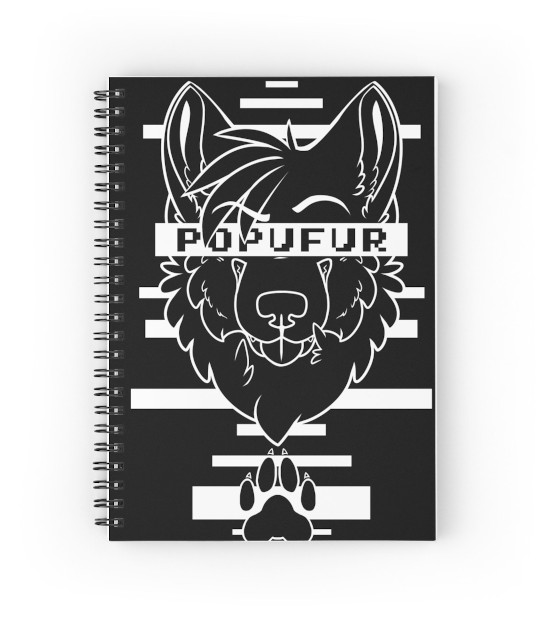
On All the Rest
What "Furry" Means to "Furry Convention"
While we point out the increasing presence of celebrity within the fandom, and though we note that "popufur" as a term has been around for a very long time, we also may note that the furry fandom is highly decentralized in a way other fandoms just aren't. In particular, and to borrow a particularly evocative phrasing from Mike Rugnetta, we are not "a geographically far-flung group of people who point their faces in the same direction -- towards the movie screen, book, or television show -- with a shared regularity, but rather a fully networked group of creatively involved fans constantly working and celebrating alongside one another". Though this quote is directed towards the parainternet fandom at large, Rugnetta specifically cites furry as the ur-fandom, the most powerful example of this sort of behaviour, in no small part due to the fact that there never has been one canonical piece of media we all revolve around. And what's important here in this quote is that, we as a community, though we may have dabbled in celebrity, have never had it as the crux of our existence -- there has never been one or several "most important furries". Instead, we revolve around each other; the fandom consists of all the people that make it up. We might talk specifically about, for example, Uncle Kage in the running of Anthrocon, but we would be remiss to not mention the innumerable other staff and volunteers who come together to make Anthrocon and all the other conventions actually happen.
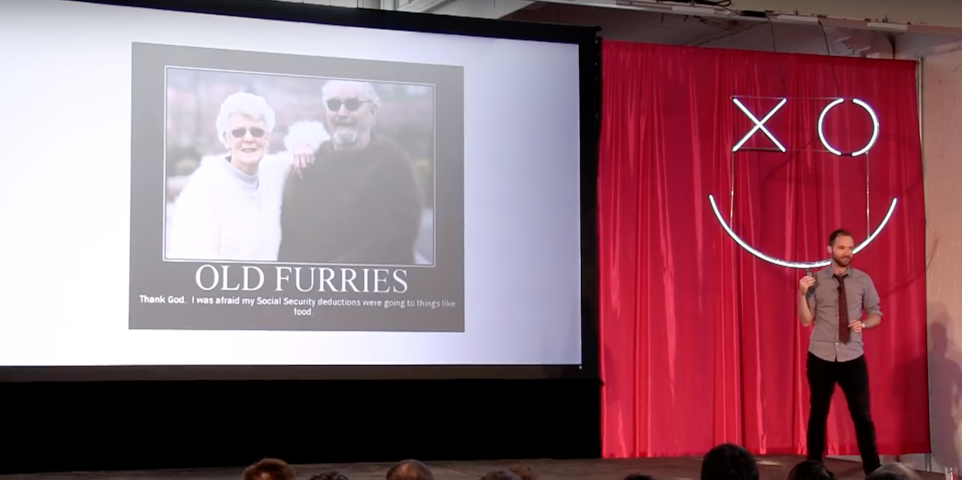
One respondent points specifically to this idea as an alternate to the path of the "more mainstream" they mentioned in a previous quote:
The way I'd like to see things go is basically an amplification of the democratic and "we're all furries, we're all equally a part of this" feeling of the fandom. Basically for stuff like dance comps, open mic, talent/variety shows, maybe even things like a panel where a bunch of artists draw live suggestions from the audience and things like that becoming the main focus of programming. Basically, the social sharing aspects, the "we all have something special to contribute" being the central part of cons. Furry conventions are already very much social events, so I can definitely see them continuing with the theme of being a place where people can share stuff that's important to them and stuff they're good at and even just things they'd like to try out doing in a non-judgmental environment without it becoming commercial and divided.
Basically, cons can either be a place you go to see stuff or see people. [...] I'd rather have them be the latter. I would not want furry conventions to have the kind of celebrity where the con staff organizes autograph hours for the guests of honor and "sponsors get to have special access to our guests" and things like that. And I'd also not want cons to become centered around their dealer room (which is how a lot of the small and mid-size anime cons I went to were, and to an extent Gen Con, though that's a different beast entirely). Ultimately, furry cons have been and should continue to be places to make friends and do fun stuff with them. Gen Con also is that, but with a con that big it's hard to meet new people. And also the culture is different -- furs are generally much more open to interact with new people, I feel, than mainstream folks are.
On the other hand, someone else notes that, as these different interests become more and more niche, they may serve to fragment the community in ways that make it difficult to share experiences with already-built groups of friends:
I welcome a diversification of events at cons, but at the same time it also makes the idea of "furry" seem a lot less unifying — it's hard to connect to a community of many fractured interests, and you spend less time with friends and S.O.s when you want to attend different panels.
Right now most people know Fox and Pepper, most people go to the Fursuit dance-off, but will there be a point where cons become an entirely "choose your own adventure" event? Would that be a good thing?
I have thoughts about the questions this individual raises, which I'll reserve for a later section, but at large the point is not without merit. My experience of a furry convention will be fairly different from other folks', and this makes doing things like describing what a furry con even is somewhat difficult -- after all, it's going to end up depending on the individual to some degree.
The Bootstrap Friendship Problem
This respondent also notes that they think the future of furry cons may well look more like anime conventions, or comic-cons. Another contributes to these thoughts between these sorts of large, less fan-run events and things like furry conventions:
After attending a dozen or more furry cons, I came away first off with the stark contrast between fan-run nonprofit gatherings and large, commercial, corporate-backed events. My initial positive experiences in the fandom were because of the friends I met in hotel rooms and parties, not in con space. As the fandom grows so exponentially as we've seen over the past few years, I realize that that particular model (small friend groups) isn't sustainable.
This perspective is particularly interesting to me, and though no respondent specifically talks about what I'm about to go into, I think what some of them have said is frequently a prelude to an idea of furry conventions as places that you can always fall into a new group of people. To give you some background, I was one of the founders of and, for two-and-a-half years led, a furry student club at my fairly large undergraduate university. One of my strong motivators for creating the club was, in part, the fact that a lot of this notion of finding small friend groups within the fandom was really, really scary to shy, anxiety-prone me -- having a pre-built one in this club meant I would always have something to fall back on, just in case. A friend of mine once commented on how I acted at my first convention, in which I basically attached myself to him for the weekend and just kinda did whatever he was doing. He wasn't entirely wrong, and I know why I did that: so I wouldn't be alone. And, for sure, I met a large number of people at that first convention, many of whom I still keep in touch with today, but I'm skeptical of this view of furry conventions as a place where you'll always just meet folks out of the blue and have a grand time with them. I have, at times, hosted room parties at conventions, and I am no stranger to policies that are well-enforced at places like MFF on things such as room doors have to be closed (that is, you can't have an open-door party that anyone can walk in on), which included times where I had to turn people away from the door that didn't always quite shut as it needed to. And while I don't want to entangle this post in the minutiae of local community politics and gossip, a recurring theme I've noticed with local communities (as well as with some more internet-based groups of folks) is that these small groups of friends can be, nearly by definition, difficult to break into. Certainly, I don't think anyone means to turn away a potential new friend, or to bar themselves off to only their small band of folks they're already comfortable with, but folks will always have some level of standards for their friends, and with new folks, you're taking a leap of faith they'll meet that bar anytime you bring them in. For many groups I've experienced, the only way in is to know somebody already in it, and that becomes a bootstrap problem -- especially at an event like a convention. To bring it back to the furry club I founded, one of my major pushes with the club was to do things with building a community that could be more open-facing; sure, it's always difficult to break into something like a club with already established friends and in-jokes and so on, but at least there's a clear pathway to do it. But, as counterpoint, the hard thing for me to tell my club members when I was trying to get them to go to MFF was that, at least for me personally, most of what I get from cons is seeing friends I don't usually see because they're not local. That was something a lot of my club members didn't have yet, and the corollary of this was that I might not hang out with them, and the people they came with might all go their own ways too. From my experience of furry cons, this is not completely strange, but it's easy for us to forget how to be in that vulnerable position the first time, trying to find a group. I got lucky and did my first con. Not everybody does.
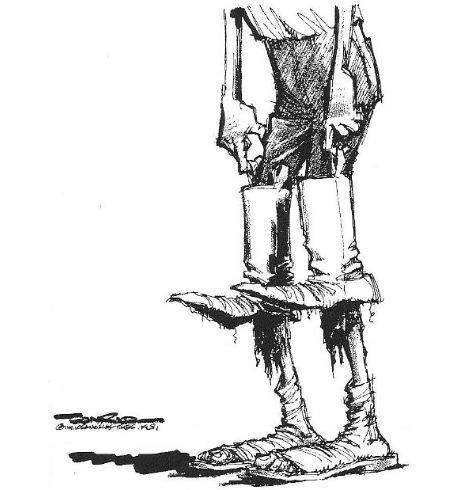
I think this speaks to a problem either that not many folks are aware of or that we don't always fully acknowledge. When I hear stories about alt-furries recruiting and grooming young people with promises of groups that will be friends and supportive to them, what I see is precisely a group of people exploiting the bootstrap friendship problem. There's a lot of young folks in the fandom who, for various reasons, may find such a proposition appealing because either the already established groups of friends seem daunting to break into or because in some cases they may be directly turned away (whether because of age or other reasons). Folks who are under the age of majority cause headaches for community leaders, to put it mildly, considering furry is also a community that has traditionally had a much more open relationship with things like sex, and though obviously minors are aware of sex and many if not most probably look at porn (I sure did, at least), this raises larger concerns about how to deal with this in a way that is healthy, and morally upstanding, and also does not put legal liability on anyone's shoulders in ways they are uncomfortable with. These are concerns which I will not go into any further in this post, but I will note that many groups answer them by just outright making their groups adults only. Surely, that is an understandable decision, but it contributes to this bootstrap problem in a difficult and unfortunate way.
In some unexpected manner, this actually ties into a somewhat unrelated idea that another respondent brings up:
I started attending furry conventions myself when I was 18 years old, right? I've gotten a lot older since then, and so has, like, everyone else.
I'm pretty lucky to be able to attend pretty much all the furry conventions I can get myself to today. From each one, I've seen a pretty consistent view -- it seems like everyone is around my age or slightly older, so it looks like the population is aging along with me.
I think... at some point, people are going to start dropping -- either from the fandom as a whole or from attending conventions -- and the cycle will start again when younger furries come of age.
I think people who have just started attending conventions, if they continue, might see themselves surrounded by older people for a while before they start seeing people of their own age.
Not to critique their experience, but this view of the furry community as one of everyone being the same age speaks to this problem of siloing into specific friend groups. I am not the same age as this individual, and since I ran this student club I was acutely aware of the fact that a majority of my club members were all younger than me. While I'm not sure of the most up-to-date data coming from groups like [adjective][species] or FurScience, we can observe two things in some of the older data; that in fact, the furry community's average age has stayed relatively consistent in the young 20s range over some period of time, and that the way this has stayed true is that Jinhai's supposition that people might start dropping is in fact borne out -- there is a nontrivial percent of folks in the fandom who do in fact seem to age out.
At large, what the respondents note, then, is that the history of furry as a fandom has influenced what furry conventions have looked like up to this point. What is unclear is how exactly this may change as things progress, and how much furry conventions continue to reflect the unique position of furry as what lies at the end of the desire path that is the Internet. This is perhaps the biggest open question in deciding the nature of the future of furry conventions, but what may not be obvious especially to older/more firmly established members of the fandom is how universal the experience they commonly cite of furry conventions actually is in the first place, as well as what the consequences are when in fact breaking into friend groups is not as simple as one may be led to believe.
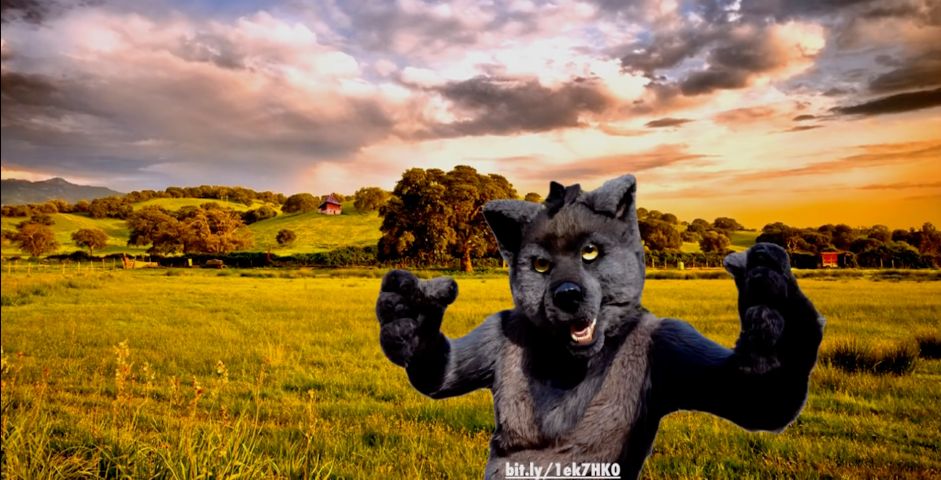
Final Thoughts
I hope you have enjoyed getting to hear a handful of folks and their thoughts on furry conventions. Reading through responses, I particularly appreciated notes like one respondent's about the increasing frequency of bewildered but supportive parents at conventions, trying to help their kids navigate to panels variously strewn about conspace. I would like to close this piece with two points.
First, a respondent brought up the question of whether cons would "become an entirely 'choose your own adventure' event". In my experience, they largely already have or always were -- I definitely know folks who really aren't all that interested in "mainstays" like dance competitions and raves and so on, and so much of mine and others' experiences of cons revolve very little around official programming. I would dare to say that, in fact, a significant portion of folks (some in my friend group, at least) pretty much does not attend any sort of panel when they go to cons -- for them, it really is choose your own adventure. I think that's part of the magic of furry cons, that so many people can find their own adventure of different sorts and that furry cons can appeal to a broad cross-section of people who don't always obviously have all that much in common. Certainly, I agree that it may be hard to connect to "a community of many fractured interests" as they put it, but I think this reflects one of the major points I've seen made about, for example, dating within the fandom. Just because two people are furries doesn't mean they have all that much in common, and certainly doesn't mean they'll make a good romantic pairing. Furry by itself is but one common point of interest. Yet, one of my favourite things about furry is how so many people can bring so much of their varied and esoteric interests into play with it. The F/F Collective's lookbooks are some of the most exciting things I've seen in furry to date, particularly because they're so dramatically unlike anything I've seen before in furry. I'm personally very hopeful that people can find new ways to express themselves and share themselves, because honestly what I want to see out of furry is people getting to show off the stuff they love the most. It doesn't matter if all of it is stuff that I necessarily would have gone out of my way to find before, so long as we can be supportive of all these new sorts of expression.
Second, I brought up what I call the friendship bootstrap problem. I think this may be a problem that really needs more attention within the fandom right now, particularly considering we're already seeing evidence that it's being exploited by people who don't always have the best intentions of others or the fandom at large at heart. For those of us who might be more inclined to reject this as a problem, and think that in fact bootstrapping friendship is decidedly always easy in furry, I would point out that there's a lot of people out there and it's hard to really live up to actually being open to just anyone. To put it another way, I have seen people sometimes say in furry that they can be friends with anyone and hang out with anyone. The really wide interpretation of that that most people have is like Auguste Gusteau's catchphrase from Ratatouille: "Anyone can cook". As the end of the movie argues, maybe not everyone can cook, but a great cook can come from anywhere, and this is what I think is true in furry. Friends do come from random places all sorts of ways, but that's not quite the same thing and sometimes we don't realize that there is a difference, nor what the importance of that difference is. For somebody just starting out, you want it to be the case that everyone will be friends with you. In point of fact, that won't be how it is, but it's still possible to find friends all sorts of places you wouldn't otherwise expect. It's just also possible that you won't. I offer up this problem, and I'm sorry to say I don't have a solution. I don't know what the answer is; I don't know how to solve the problem that when you have an established group of friends, it's a concerted effort by all involved to be able to let other people join it. I do think it's something that clever people in our clever world of furs can think about and approach, and that's what I hope to see in the near future.
With all this said, I am genuinely interested in things like events we might see in the future at furry cons, as well as any thoughts anybody else has. For those I've talked to directly, you know how to get in contact with me to add to the piece, but for everyone else, I've set up an email for the occasion: furconfuture [at] coyo [dot] tl. I check the account that funnels into semi-regularly, and intend to update the piece periodically as folks write in. Please don't hesitate to share your thoughts.
Additional Thoughts in Revision
Having come back to this now half a year later, there's a few additional things I've been thinking about in relation to this topic. On the one hand, in an off-handed conversation with a different individual, they mentioned that some people involved in running conventions were beginning to approach them as needing to specialize. That is, the belief was that a convention, even a regionally based one, might need to find a niche to continue to grow. They cited ANE as developing a niche around live music. I've done some work and come to a similar conclusion, at least for new conventions. And between Aquatifur and the upcoming Sin City Murr Con, it appears that this has also already begun to happen to some degree. As a separate thought, I wonder if this is the beginning of my own (and others I've been talking to's) aging-out, that I've started to think about doing things like taking trips to visit friends directly instead of going to conventions. Of course, conventions still have their place, but for the stated goal of things like meeting up with friends from afar, they're not always the best place to do that, for reasons like respondents above have brought up. But this isn't any sort of definitive statement about what will happen to conventions.
Named Participants
- Honorius
- Jack-Jackal
- Jinhai
- Ohmega_wulf
- Roweland
- Toretto the Dragon
- @whiskers_kitteh

Comments
Feel free to share your comments here. I approve each comment before it becomes visible. Sorry if this doesn't happen quickly; I have other stuff going on sometimes. Use common sense about what to post; no racism, no sexism, no homophobia, no transphobia, and so on. Be good to each other, that is. If you format your comments in Markdown, they will be rendered when they get put up on the site (though some features, like images, are not supported).
There are currently no approved comments.
make comment